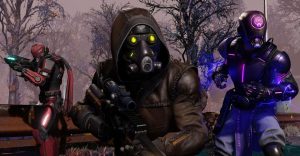Why God Of War’s Dead Keep Rising

One recurring theme in God of War is the inability of mortals to stay dead, creating enemies for Kratos and Atreus to kill twice, but why is this happening, and what does it imply? Zombie enemies are common in most fighting games, but God of War fans may search for a canonical reason for the mass resurrections. Unfortunately, God of War isn’t as forthcoming with the stories of minor enemies. Thankfully, players who pay attention to character dialogue and understand Norse mythology can learn why God of War’s deceased mortals keep resurrecting.
God of War takes place many years after Kratos floods Greece and destroys the Greek pantheon. He settles down with a wife named Faye and sires a son named Atreus. After Faye’s death, Kratos and Atreus burn her body and embark on a journey to the highest peak in the realms. Unfortunately, the father-son duo is pursued by Norse gods and monsters alike, including the undead. Though undead enemies existed in previous games in God of War’s chronological timeline throughout the Grecian Underworld, reanimation is relatively new to Midgard and the other realms.
Undead enemies aren’t new to God of War, with many mythologies featuring a unique zombie-type creature. God of War‘s in-game files refer to the Draugr as stranded, undead warriors unable to pass onto the next life due to various reasons, including unfinished business, unsettled scores, or untamable rage. These monsters aren’t as powerful as some of the mythical beasts that players can encounter throughout God of War but still hold disturbing implications for the world around them. While the reason for their reanimation doesn’t present itself outright in the main storyline, several characters comment on the situation, and God of War’s side quests offer extra lore. In short, there are several reasons why the mortals can’t remain in Helheim and continue rising as undead enemies.
Freya Says Someone Interfered With “Powerful Forces” In God Of War

When Kratos and Atreus first encounter the undead in God of War during their first encounter with mortals, neither character pays them any mind and continues forward. It’s not until the father and son meet a group of mortals face-to-face and watch them resurrect that they understand the world’s unstable condition. Despite his past encounters with the undead, even Kratos is unsure about the cause of the spontaneous resurrections. It’s not until the pair meets Freya that vague answers are provided. When questioning the former goddess about Midgard’s chaos, she remarks that someone interfered with “powerful forces” and disturbed the dead’s journeys to the afterlife. From players’ first mission, God of War introduces several powerful individuals that may have disrupted the natural order.
God of War’s Aesir are known to be proud, vain, and violent, often picking fights with other tribes of gods and destroying those who stand in their way. Despite having the loyalty of many mortals, gods like Odin and Thor require more than worship. It’s possible that Thor’s genocide against the giants or Baldur’s desperation to kill himself disrupted the natural order. Eliminating an entire species from the Nine Realms presents a noticeable imbalance that could have some dangerous drawbacks, especially considering the species’ aptitude for magic. Alternatively, if Baldur somehow disrupted Helheim’s stability in his attempts to die, it’s unlikely for Kratos or Atreus to remedy the situation before Ragnarok arrives. However, there is another god that could be responsible for the situation.
Odin Cursed God Of War’s Valkyries

During Mimir’s stories in God of War, the head narrates the conflict between the Vanir and the Aesir, which Odin only settled by marrying Freya, the Vanir’s leader and Valkyrie Queen. Though the pair existed in relative peace and began to tolerate one another, Odin’s paranoia and bloodlust soon urged Freya away. She soon fled Odin’s side but could not escape his curses and became stranded on Midgard without her powers. It’s later learned that Odin also punished the Valkyries, Freya’s former comrades, and locked them away in vaults across the Nine Realms. When players begin to battle the Valkyries, Mimir, Atreus, and Kratos begin to discuss the Valkyries’ roles in life.
God of War‘s Valkyries are responsible for guiding half the warriors that die in battle to Valhalla, the heavenly afterlife where honorable warriors fight and feast for eternity. It’s said that if warriors deny their Valkyrie guide and engage them in combat, they are doomed to walk Midgard as a Draugr. Unfortunately, defeating the Valkyries and freeing them from their imprisonment doesn’t keep mortal warriors from rising again, suggesting that Odin’s curses aren’t the only reason Midgardians can’t reach the afterlife. Considering most mortals left in the lands are bandits, reavers, and warriors, it’s likely that without the Valkyries, all mortals killed are stranded as Draugr and signify a darker period for the Nine Realms.
God Of War’s Restless Undead Signal Ragnarok

2018’s God of War shifted from Greek mythology to Norse mythology, but this doesn’t set out the God of War pulls from Norse mythology and is likely referencing some of the many doomsday signs present throughout ancient cultures. A common theme for mythological doomsdays is the afterlife filling up and spilling into the living world, emphasizing the evilest individuals returning from the dead to wreak havoc once more. Athena’s brief return in God of War suggests Kratos may also face some unwanted demons from his past or dangerous enemies previously killed as he and Atreus face Ragnarok.
It’s likely that as Ragnarok draws closer, players can expect to face more of Midgard’s undead. Players last encountered undead in God of War‘s Underworld, where Kratos fought to break free from Hades’ realm. Kratos also explored Helheim during God of War, where he confronted deceased nightmares from his past. While it’s largely unknown what impact God of War: Ragnarok will have on the Nine Realms, Santa Monica Studios confirmed the upcoming 2022 title would be the end of Kratos’ time in Norse mythology. If Ragnarok comes to pass, it’s likely the endless undead would make the Nine Realms uninhabitable and force Kratos and Atreus to leave.
Santa Monica Studios hasn’t revealed a complete image of God of War: Ragnarok, but the declining state of Midgard suggests Kratos and Atreus could face dire threats beyond the gods. The scarce mortal population suggests many natives have fled, leaving only rogue warriors and bandits to suffer the consequences. It’s unknown if God of War: Ragnarok will feature more undead, but given the decaying state of the Norse pantheon’s lands, it’s likely players can expect more monsters.
God of War: Ragnarok is scheduled to release in 2022 but has no release date.
About The Author


















